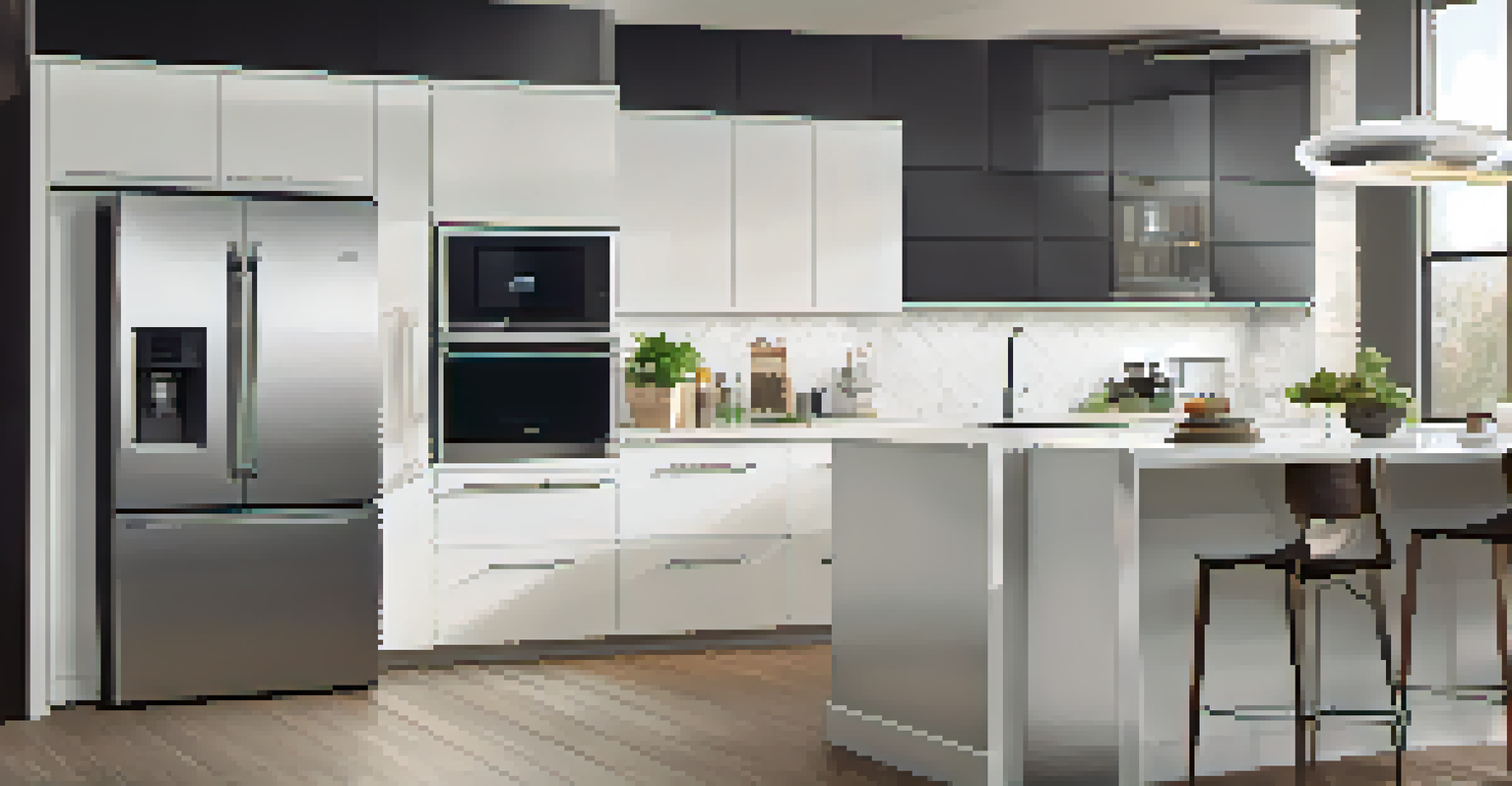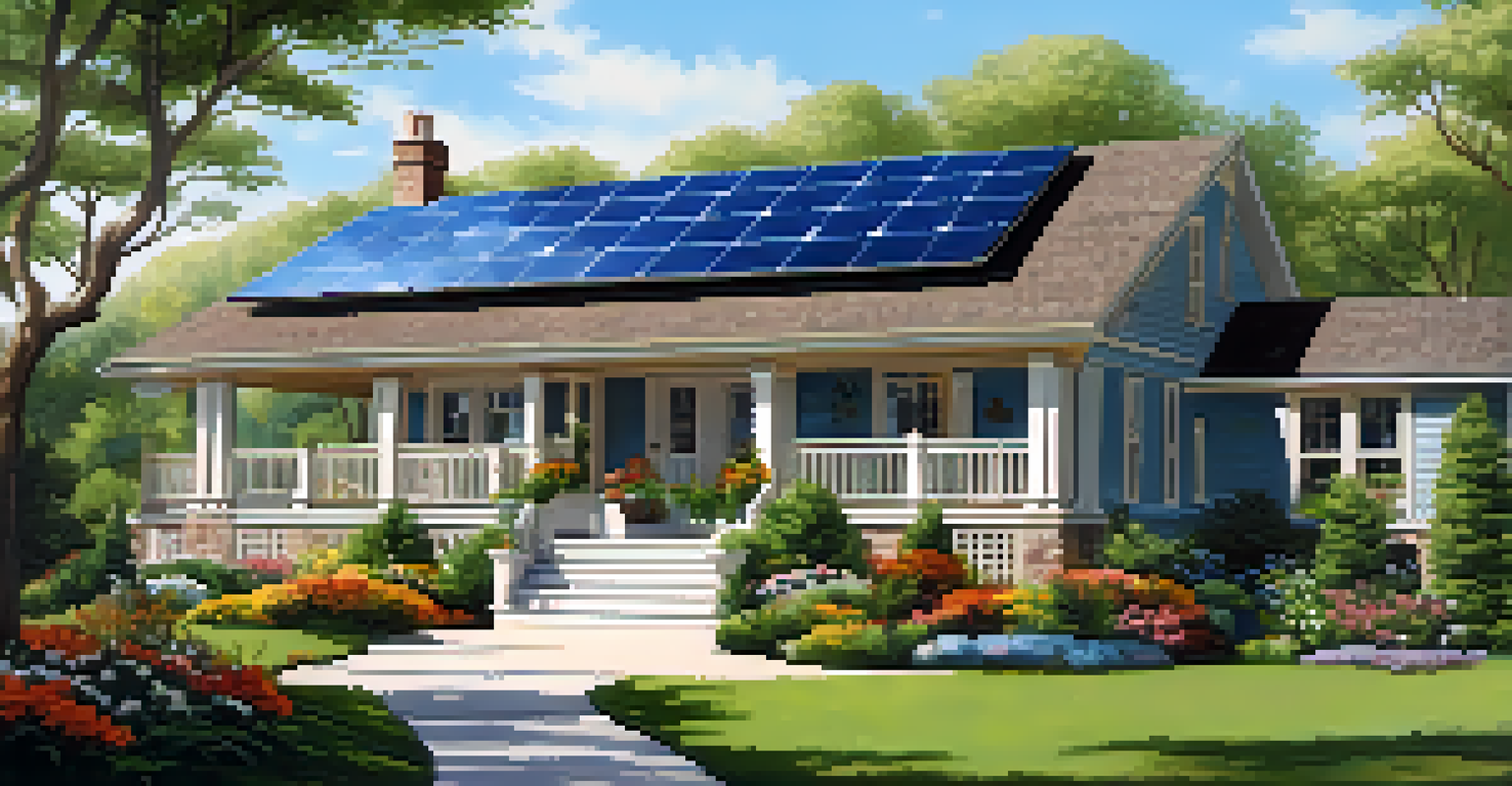The Role of Home Automation in Energy Efficiency

Understanding Home Automation and Its Benefits
Home automation refers to the use of technology to control household systems like lighting, heating, and security. By integrating smart devices, homeowners can manage their environment more efficiently and conveniently. This not only simplifies daily routines but also opens the door to significant energy savings.
Technology is best when it brings people together.
For instance, smart thermostats learn your preferences and adjust temperatures accordingly, ensuring comfort without unnecessary energy use. Similarly, automated lighting systems can turn off lights in unoccupied rooms, minimizing wastage. These benefits contribute to a more sustainable lifestyle while enhancing the overall quality of home living.
As we dive deeper into the role of home automation in energy efficiency, it’s essential to recognize its potential to transform everyday living. With a little help from technology, we can make our homes not just smarter, but also greener.
Smart Thermostats: The Heart of Energy Management
Smart thermostats are often considered the cornerstone of home automation systems. They allow users to set schedules and control temperatures remotely, ensuring that energy isn’t wasted when no one is home. By adjusting heating and cooling based on occupancy, these devices can significantly reduce energy consumption.

For example, if you’re at work during the day, a smart thermostat can automatically lower the temperature in winter or raise it in summer, saving energy while you’re away. Many models also provide energy usage reports, helping homeowners understand their consumption patterns and make informed adjustments.
Home Automation Enhances Efficiency
Integrating smart devices in homes simplifies routines and significantly reduces energy consumption.
Overall, smart thermostats not only enhance comfort but also play a crucial role in optimizing energy efficiency. They exemplify how intelligent technology can lead to smarter energy choices in our daily lives.
Automated Lighting Solutions for Energy Savings
Automated lighting systems are another key feature of home automation that contributes to energy efficiency. These systems can adjust lighting levels based on the time of day or occupancy, ensuring that lights are only on when needed. This not only reduces electricity costs but also extends the lifespan of light bulbs.
The greatest threat to our planet is the belief that someone else will save it.
Consider a scenario where motion sensors detect movement in a room and automatically turn on the lights. Once the room is empty, the lights will turn off after a set period, preventing unnecessary energy use. Additionally, smart bulbs can be programmed to dim or change colors, further enhancing energy savings.
By incorporating automated lighting solutions, homeowners can create an energy-efficient environment that adapts to their needs. This efficiency is not only beneficial for the wallet but also supports broader sustainability goals.
Energy Monitoring: Keeping Track of Consumption
Energy monitoring systems offer valuable insights into household energy consumption. These devices track real-time energy usage, allowing homeowners to identify patterns and make necessary adjustments. By understanding where and how energy is used, families can implement strategies to reduce waste.
For instance, an energy monitoring system may reveal that a specific appliance consumes more energy than anticipated. With this knowledge, homeowners can choose to use that appliance during off-peak hours or consider replacing it with a more efficient model. This proactive approach can lead to substantial energy savings over time.
Smart Thermostats Optimize Comfort
Smart thermostats adjust temperatures based on occupancy, ensuring comfort while minimizing energy waste.
Ultimately, energy monitoring empowers homeowners to take control of their energy use. By making informed decisions based on data, we can all contribute to a more energy-efficient future.
Smart Appliances: Efficiency Meets Convenience
Smart appliances are designed to enhance convenience while also being energy-efficient. These devices, including refrigerators, washing machines, and ovens, can be controlled remotely and often come with energy-saving features. This integration of technology not only simplifies tasks but also optimizes energy consumption.
For example, a smart washing machine can run cycles during off-peak hours when energy rates are lower, saving money and reducing strain on the power grid. Some appliances even provide usage statistics, helping users make better choices about their energy habits.
By incorporating smart appliances into our homes, we can enjoy modern conveniences without compromising our commitment to energy efficiency. This harmonious blend of technology and sustainability is a hallmark of the home automation revolution.
The Role of Home Automation in Renewable Energy Use
Home automation plays a significant role in maximizing the efficiency of renewable energy resources. For homeowners with solar panels, smart systems can optimize energy usage by controlling when appliances operate, ensuring that they run when solar energy is most abundant. This smart scheduling can lead to considerable savings on energy bills.
Additionally, home automation can facilitate energy storage solutions, such as battery systems that store excess solar energy for later use. By managing both generation and consumption, homeowners can make the most out of their renewable energy investments.
Renewable Energy Meets Smart Tech
Home automation maximizes the use of renewable energy by scheduling appliances to run when solar energy is plentiful.
In essence, home automation not only enhances energy efficiency but also supports the transition to renewable energy sources. This synergy is key to creating sustainable living environments for the future.
Integrating Home Automation with Energy Efficiency Goals
To truly harness the power of home automation for energy efficiency, it’s essential to integrate these systems with broader energy-saving goals. Homeowners can start by conducting an energy audit to identify areas where automation can make a difference. This proactive approach ensures that technology aligns with specific energy-saving objectives.
For example, if a household aims to reduce energy consumption by 20%, leveraging smart devices strategically can help achieve this target. By setting realistic goals and utilizing technology to monitor progress, families can stay motivated and accountable.

Ultimately, the integration of home automation with energy efficiency goals creates a roadmap for sustainable living. With clear objectives and the right tools, homeowners can significantly reduce their environmental impact while enjoying the benefits of modern technology.
The Future of Home Automation and Energy Efficiency
As technology continues to evolve, the future of home automation looks promising, particularly in the realm of energy efficiency. Innovations such as artificial intelligence (AI) and machine learning are expected to enhance the capabilities of smart devices, allowing for even more efficient energy management. These advancements will make homes smarter and more responsive to individual needs.
Moreover, as more consumers adopt energy-efficient technologies, there will be a collective push towards sustainability. This shift will not only benefit homeowners financially but also contribute to reducing the overall carbon footprint of our communities.
In conclusion, the future of home automation is bright, with immense potential to drive energy efficiency. By embracing these advancements, we can create a more sustainable and energy-conscious world, benefiting both our homes and the planet.